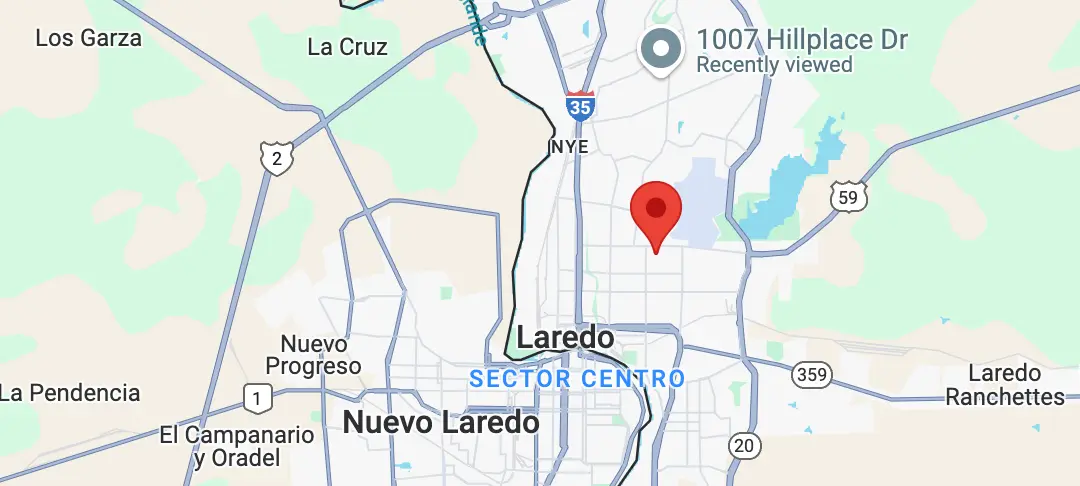Stress Reduction Techniques
Quick Ways to Manage Short and Long-Term Stress
Proven Techniques to Cope with Stress in Daily Life!
Table of contents:
- Introduction
- Stress and the science behind it
- Types of stress
- How to identify the root cause of stress
- Why stress and anxiety management is important?
- The symptoms of stress
- Best stress management techniques
- How to get rid of long-term stress
- How to reduce stress fast at home
- Stress reduction techniques for students
- Stress relief activities for adults
- The Silva Method for Stress & Anxiety

Did you hear about this news?
The tragic incident of an employee in Japan’s top advertising agency has numbed the entire nation, which highlights the harsh reality of how extreme work stress can have a huge consequence in your life.
However, the reality is that stress is not only restricted to work; it clings to you in every part of your life. It can include having pressure about completing a task before the deadline, taking important decisions, or sometimes relationship issues that can cause stress in your life. Even when we don’t have anything to stress about, we take stress over things that don’t even exist. That’s the basic human nature you can’t escape! If you want to break free from these things- keep reading this article till the end. We will discuss how to cope with stress in daily life, from learning about practical techniques to using stress reduction exercises in tackling challenges.
You will find ways to gain control over your life and welcome peace and clarity with the best stress reduction techniques!
Key Takeaways
- Stress responds naturally to challenges, which can affect us physically, emotionally, and psychologically. When the brain triggers the fight-or-flight response, it releases stress hormones and results in negative effects on the mind and body, like fear and anxiety.
- Finding out the root cause of stress can solve 50% of life’s problems. Noticing a few things, like how you normalize stress or whether you always expect the worst outcomes, can help you understand what is causing you stress.
Powerful meditation techniques for stress relief, like deep breathing and mindfulness meditation, can help you manage stress and face life’s challenges easily.
- To reduce stress fast at home, you can try practicing deep breathing exercises, creating a cozy space for yourself, listening to music, etc.
- A small change in daily life, such as a healthy lifestyle, taking a break and practicing mindfulness exercise, or setting a healthy boundary for yourself, can prevent long-term stress.
- Get to know the main reason of stress for students and how following certain techniques like, time management, creating a schedule, and eliminating the reason causing stress.
Stress What Is The Science Behind It?
Stress is just a reaction or response in the body to the challenges we face in reality. It can either be physical, emotional, or psychological, stress can motivate us to tackle challenges during difficult situations.
Stress can have a physiological reaction which includes interaction between the brain, the nervous system, and other hormones. When we experience a feeling of threat, it’s natural for our brain to trigger the fight-or-flight response, which, as a result, can release stress hormones like cortisol and adrenaline.Stress is just a reaction or response in the body to the challenges we face in reality. It can either be physical, emotional, or psychological, stress can motivate us to tackle challenges during difficult situations.
There are two important parts of our brain that play an important role in managing stress:
1. The Hypothalamus: This part of the brain is responsible for controlling many functions like body temperature, hunger, or sleep. The hypothalamus has the power to identify the stress response, send a signal to the body, and release stress hormones. This can make you hyper-stress, which results in a negative impact on your body.
2. The Amygdala: This part of the brain controls emotions like fear and anxiety. It can instantly sense the threat around. Through this, the amygdala can trigger stress hormones, making the brain hyper-alert and feel extreme anxiety, fear, and emotional numbing.
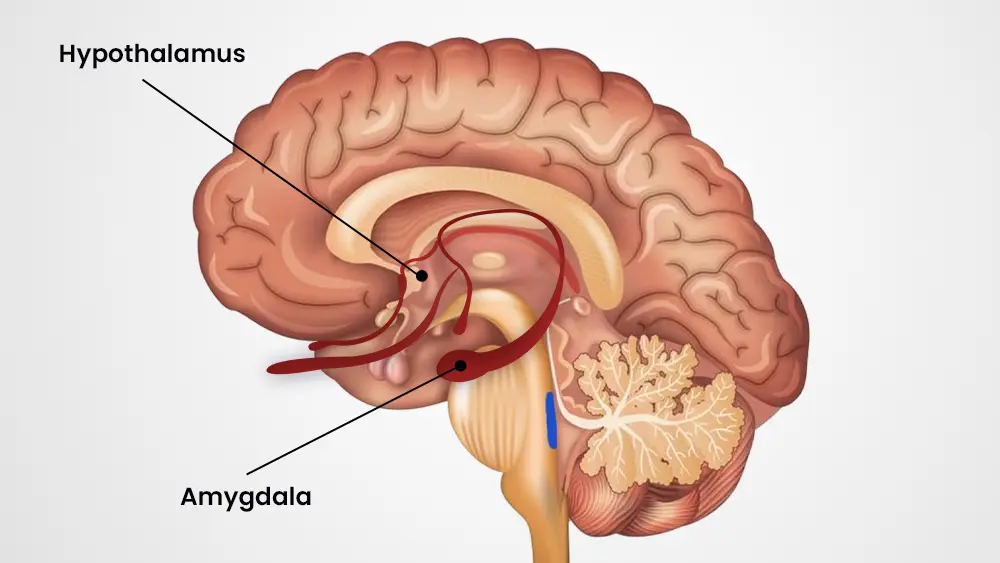
Types of Stress - You Need to Know
Before Learning about the Stress Management Techniques
To learn about stress management techniques, it is important to understand the different types of stress and choose the correct approach to manage your stress.
Acute stress
This is the most common type of stress, which happens for a short period of time. It usually gets over when the situation causing stress is resolved. Common reasons for this stress include completing a work deadline, public speaking, interviews, arguments, etc.
Episodic Acute Stress
Episodic Acute Stress is the repetition of the same acute stress caused due to handling multiple tasks, or when your boss calls, etc. This can lead you to experience chronic stress, which impacts your physical and mental health.
Chronic Stress
Chronic stress is the most difficult and worst kind of stress, as it feels like never-ending, caused due to ongoing life problems. Common examples of this type of stress are financial issues, relationship problems, or being stuck in an unwanted environment.
Psychological Stress
Psychological stress is caused by mental pressure, which generally happens due to overwhelming thoughts, depression, or feeling burnout. This can affect you mentally and result in emotional trauma.
Meditation for Stress Relief: Why You Should Make Space for Inner Peace
Allows you to reconnect with yourself and release built-up stress.
Regular meditation can give a clear perspective on life.
Easy to manage emotions and promotes calmness to deal with daily challenges.
You can develop a habit of mindfulness making you more present and at peace.
Stress reduction meditation can reduce the physical symptoms of anxiety.
How to Identify the Root Cause of Stress In Your Life?
One interesting fact you must know: when you identify the root cause of stress in your life, you can resolve approximately 50% of life’s problems. Before starting to practice the best stress reduction methods, figuring out the major stressors in life is extremely important. It can either be job-changing anxiety, moving somewhere, experiencing emotional trauma, or anything. Maybe you already know the reasons that are causing you stress, but sometimes we neglect the fact that it can be our thoughts that are multiplying our stress than it actually is.
Check out these few quick facts that can help you to understand the cause of stress:
- 1.Do you remember the last time you breathed a sigh of relief? No, right? This is because you keep stressing yourself out and think of it as temporary stress, even when the stress cycle is ongoing.
- 2.Notice if certain people or situations trigger you leading you towards stress.
- 3.Do you always find yourself lost in catastrophizing (expecting the worst outcomes)?
- 4.Observe your daily habits, which may include a sleep schedule, losing motivation to do work, unhealthy eating, etc.
- 5.Figure out whether you avoid the situation that is causing you stress or how you usually cope with it. Is it through excessive eating or increasing your screen time?
Fast fact: You can try journaling every day before going to bed! This is one of the quick stress reduction techniques you can follow to track down the situations or reasons that made you stress. This helps you to take the right action next time when you face the same situation.
Why Stress and Anxiety Management is Important?
Stress and anxiety management is important to live a better quality of life. These are nothing but just a reaction to the daily challenges we face in life, but once the stress gets overwhelming, it can result in a negative impact on our physical and mental health. You might face issues like depression, anxiety, lack of focus, and even relationship problems.
It’s time now to alter these situations and live life with confidence without being anxious and overwhelmed. Powerful techniques such as meditation for stress relief, mindfulness-based stress reduction techniques, or Breathing exercises for anxiety can be your guide to manage life’s struggles with ease.
Prioritizing your mental health through Stress reduction techniques is the first step to gaining mental clarity and living a balanced and better life.
So, stop and take a pause for yourself today!
Indulge yourself in self-care practices for stress to make yourself more powerful than before.

Understand the Symptoms of Stress- How It Impacts Your Mind and Body
There are certain signs of stress which you should not ignore! You can notice how your physical and mental health gets affected due to extreme stress. Not being able to manage stress can cause many serious health issues like high blood pressure, stroke, obesity, heart problems, etc.
Let’s look at these different symptoms physically and mentally in order to figure out the best ways to manage stress:
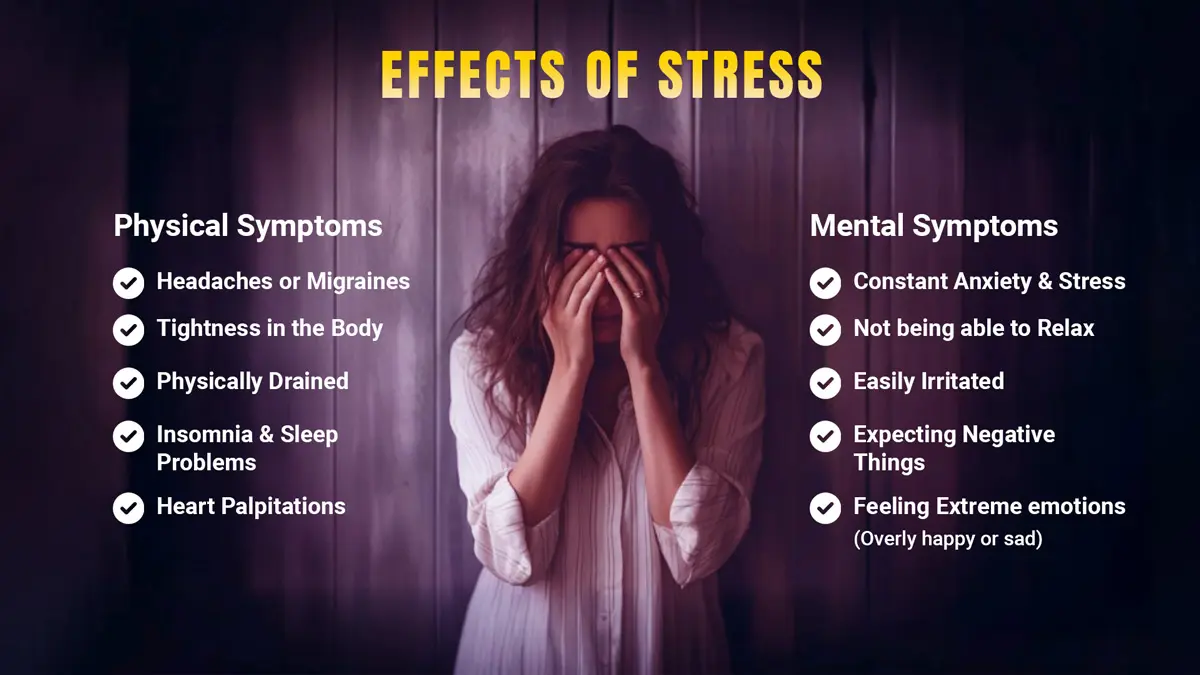
Fast fact:When you are experiencing chronic stress, it is highly important to take action and manage stress effectively. This can result in serious health issues which reduces your lifespan. So, before stress destroys your overall mental and physical health, try biofeedback for stress reduction. In this process, you can be more aware of your physiological functions and manage stress with relaxation exercises.
Best Stress Management Techniques
Check out these scientifically proven techniques to manage stress effectively and figure out which techniques are the right ones for you!

Breathing exercises for stress reduction
Constant stress and overwhelming feeling can be a sign for you to take a break and just relax. Try practicing deep breathing exercises, as this is one of the quick stress reduction techniques. You can try this technique: At first, take a slow deep breath, inhale through your nose, and count up to 4 seconds before exhaling. After this quick session, you can feel the tension releasing from your body, and you can instantly calm yourself down.
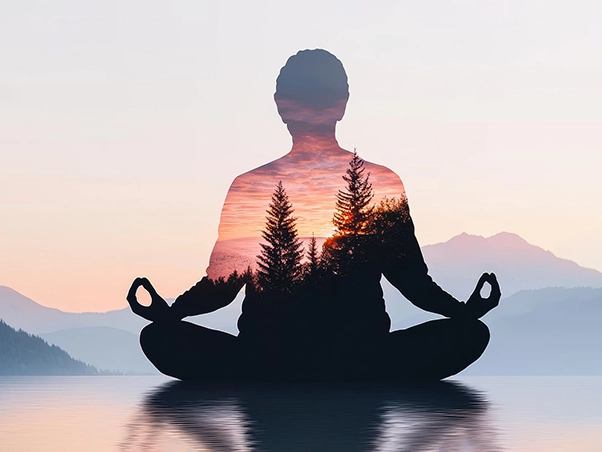
Mindfulness Meditation
One of the main reasons for our stress is not being able to stay in the present moment. Practicing mindfulness stress reduction techniques can help you to reduce stress and anxiety. By keeping your focus on the present moment, you can stop yourself from getting distracted from past and future worries and build better emotional strength.

Engaging in Physical Activity
Indulging in stress management exercises for relaxation is another useful technique to release stress. You can practice yoga, running, walking, or even dancing. Through this, you can feel your body releasing endorphins, and you can experience instant calmness.
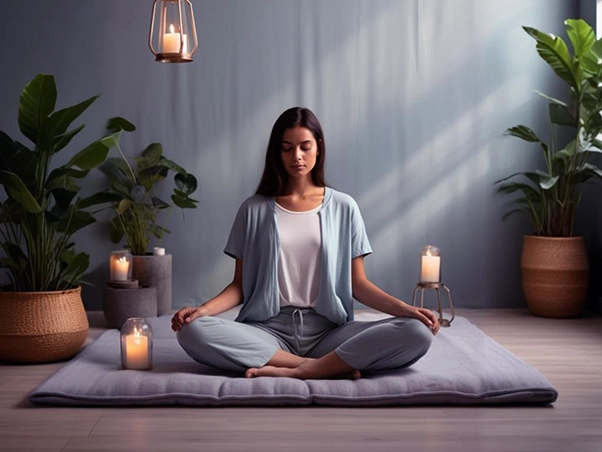
Progressive Muscle Relaxation
Mental Stress can impact our body and can show signs through headaches, muscle tension, digestion problems, insomnia, weak immunity system, etc. Through this technique, you can release tension from your whole body and regain balance in life.

Time Management
Not being able to manage time and keeping your task pending can make you feel overwhelmed. So, learn to organize your tasks and manage time beforehand to not get overwhelmed at the last moment.
How do you reduce stress fast at home?
Best Relaxation techniques for stress relief
Do you want to know the best relaxation techniques for stress relief that you can practice at home? In this section, we will explore some of the best techniques at home in a cozy and comforting environment.
Deep breathing exercises for stress relief
Sometimes just by breathing in and breathing out, you can feel a lot lighter within yourself. All you need to do is close your eyes and, inhale deeply, after holding your breath for a few seconds, exhale. Repeat this a few more times, and you can feel instant relaxation in yourself.
Make a Cozy & Relaxing Surrounding
Create a cozy and warm environment in your room. You can light scented candles, turn on relaxing music, or keep soft cushions on the floor. Just vibe into this environment, forget about your stress, and enjoy living in the present moment.
Move Your Body
Every morning you are advised to move your body and practice yoga or stretching. This can help your body to relieve stress and feel complete relaxation. If you want, then you can even take a quick walk or dance to your favorite song; this can boost your mood instantly.
Listen to Some Relaxing Music
The best therapy anyone can have for free is music! It can instantly make you feel lighter and help you to forget about your stress and worries. If you want, then you can listen to nature sounds to teleport yourself in a calm and peaceful state.
Make Visualization Your Gateway to Peace
One of the best stress relief activities that is highly recommended is visualization. This can be a great way to escape from reality and create a peaceful environment for yourself. All you need to do is just close your eyes, imagine yourself in a quiet place like, a beach, forest, or maybe in your cozy room where you are away from all the worries and stay in the present moment.
Take a Small Break
It is really important to take a small break once in a while. Even if you feel like you are too busy to pause for a moment, remember no work is more important than your mental health. Just turn your phone off for a few minutes and allow yourself to relax.
Don’t forget to express gratitude
Focus on all the great things you’ve experienced so far. Reflect on all the moments you are grateful for, this way, you can feel a lot better and happy.
Quick fact:Don’t forget to nourish your body! Eating proper nutrition and hydrating yourself is the best way to recharge your body and boost your mood.
Meditation: A Natural Way to Reduce Stress
Life never stops for anything, it keeps moving and stress can enter our life without us noticing. But don’t you want to feel calmer and relaxed in between your hectic life? Yes, you can with stress reduction meditation. Meditation is not just a practice, it’s a way of finding peace in your life.
For a better and refreshed morning, you can practice Morning meditation , as the way we start our day can impact our mindset. Take a few minutes from your day, feel the stillness around you, and get ready to handle any challenges that come your way.
There is no perfect time to meditate. If you feel like you don’t have enough time to meditate during the day, then you can also practice at night. Sleep meditation is one of the relaxing way to end your day. This practice can relax your whole body and you can release any tension stored within you during the whole day.
Get ready to experience the power of meditation! The Silva Method is a self-help program where you can find transcendental meditation techniques with powerful stress management tools. Let go of stress and feel calmness with guided visualizations, mental exercises, and deep relaxation.
How to Get Rid of Long-Term Stress?
5 Effective Stress reduction methods
It is believed that a small change can impact your life. So, choosing the right way to live or following the right habits can fix you. Here are some quick stress relief techniques that can bring calm and balance to your everyday life and can prevent long-term stress:
Choose a Healthy Lifestyle
Choosing to live a life with healthy habits is one of the effective stress management techniques. Sometimes basic things like getting enough sleep, taking proper nutrition, or hydrating yourself matter a lot. A nourished and healthy body is a great way to prevent health issues and can improve mental health. Practicing these self-care stress management techniques can benefit you, and you can notice changes within yourself over time.
Mindfulness for Stress Management
Practicing mindfulness meditation is like a reset button for your mind. Constant work pressure and stress in everyday life can suffocate our minds and distract us from living in the present. Regularly practicing mindfulness meditation can help you to cope with stress and handle challenges better. This technique involves deep breathing, where you imagine yourself in a relaxing state and just focus on the present moment. This way you can release any tension and worries from the past and future and indulge yourself in the present.
Physical Exercise
Remember, regularly exercising is not only about physical fitness; it also helps you to reduce stress and tension in your life. Through exercise, the body releases endorphin hormones, and you can notice yourself feeling calmer and more positive in your mind and body.
Don’t Overburden Yourself
It’s really important to say no to the things or responsibilities that make you feel burned out. Prioritizing your mental health can alter your life with positivity. Stress reduction techniques in psychology suggest that setting healthy boundaries for yourself is a powerful way to balance your life in a healthy way. Pro Tip: To shift your focus and stop the overwhelming feeling, you can try journaling. This helps you to reflect on the positive side of the life you are having. Experiencing high stress can force you to think negatively, that’s why expressing your thoughts through journaling can be an effective stress reduction method.
Seek Social Support
Sometimes, just being able to talk to someone can help you a lot and give you mental support. Communicating with friends or a family member you are close to can give you strength. Try to engage yourself in stress relief activities, for example a group meditation session, game night with friends, etc. This way you can feel more relaxed and happy.
Do You Struggle With Stress As a Student?
Stress reduction techniques for students
It can sometimes feel overwhelming to be a student. Managing academic pressures, deadlines, completing assignments, and personal responsibilities. This can affect you mentally and lead to losing motivation to study. Let’s look at some of the reasons that stress out the students:
Creating a Schedule Beforehand
It’s better to plan a schedule beforehand for studying or completing a task before a deadline. This way, you can feel more control within yourself and stop yourself from getting panic at the last moment.
Breathing techniques for stress reduction
Deep breathing exercises for stress relief are beneficial to manage stress and improve focus. Deep breathing helps to calm the nervous system, which makes it easier for you to handle challenges with confidence and clarity.
Get a Good Sleep
It’s common to not have a proper sleep routine due to pressure or a tight schedule. This can be one of the main reasons that you feel unproductive and find it difficult to focus. Allow yourself to relax and take a nap to feel more energetic and refreshed and continue with your work.
Connect with Friends
Don’t forget to have healthy relationships in your life. Prioritize talking to someone you can share your pent-up emotions and stress. You can create a study group that will encourage you to study with motivation by keeping the stress aside.
Try to recognize the things that Stresses You Out
The best way to manage stress is to find out the reason that is stressing you out. Think about all the things that make you overthink or give you anxiety. Cut them off, and you will notice how your life feels better when you just focus on the right things in life.
Recap
Trying to cope with academic and personal challenges can feel overwhelming. Try to make a schedule for your entire day, like for studying, taking a break, or completing an assignment within this hour. Other than that you can incorporate deep breathing exercises, get a proper 7-8 hours of sleep, and communicate with friends
Adulting is Hard & Stressful!
Stress Relief Activities for Adults
Stress is an unwanted guest of our life, whom we cannot ignore even if we want to. That’s why learning how to cope with stress isn’t just important—it’s essential. Here’s how to incorporate simple yet powerful stress relief activities for adults to help you breathe a bit easier and truly feel like yourself again.
Gardening
Don’t you feel like your inner child is healing when you watch a plant grow? Gardening is actually a great way to connect with nature and feel calmer by switching off the stress and tension in reality.
Art and Craft Projects
You can engage yourself in creative activities like painting, knitting, drawing, etc. It is said that when it gets difficult for you to express yourself, you can paint your emotions on the canvas. When you keep your focus on the craft you create something beautiful and this gives you satisfaction and peace.
Taking a Walk in Nature
Take a break once you feel stuck and the walls around you suffocate you. Walking in the nature, feeling a breath of fresh air, and listening to the birds chirping. You can instantly feel a boost of happiness within yourself.
Cooking or baking
Yes, cooking is not only about feeding yourself; it can make you feel content if done with passion. Slicing vegetables perfectly or arranging the ingredients, and you can delight yourself with the aroma of your favorite food. Serving food to your loved ones or for yourself is one of the greatest joys anyone can have.
Exercise
Exercise doesn’t always mean you have to sweat yourself out or go to the gym. Instead, you can just move your body like taking Zumba classes, groove to your favorite music, or practice some yoga for stress relief. This can be the perfect way to shake the stress off your mind, making you feel more alive than before.
Board Games and Puzzles
Want to bring the lost smile on your face? Connect with your friends and family. And the best way to do that is by gathering around for board games with friends and family. The excitement of winning can make you feel a lot lighter and happy. You can even try to play solo puzzles, as this is also a great meditative approach that helps you to focus on the game and distracts you from the tension for a while.
Read a Book
When you feel like your reality is stressing you out, reading a book can be used as one of the best stress and coping strategies. A book can help you sweep away your stress and allow your mind to divert from all the tension and worries in reality.
Listen to Your Favorite Music
Music is an unpaid therapy in your life! Listening to your favorite music can teleport you into a different world where you are free from your stress and worries. Just you and your music can be a powerful duo that can handle any challenges. You can even listen to soothing music or guided meditation to help yourself feel more calmer and refreshed.
Mindful Stress Reduction Techniques
Mindful stress reduction techniques include meditation, deep breathing exercises, yoga for stress reduction, and tai chi; this practice can help you to align your body, mind, & soul. This is a great way to improve awareness and help you to relax from within. For those who find it difficult to feel calm and stay in the present moment.
Volunteering
No matter how many different techniques we try, the best way to cope with stress is to help someone else. When you engage yourself in giving emotional support to someone who needs it or just connecting with someone can make you feel a lot better and fulfilled within yourself.
Saying yes to these stress relief activities can be a great step for you to allow and accept simple joys in life. Remember to take a pause once in a while and prioritize your mental health because it’s worth it!

The Silva Method
Learn The Best Coping Skills for Stress & Anxiety
The Silva Method- America’s first mind empowerment program, developed by Jose Silva in the 1960s. The Silva Method has been proven to change the lives of more than 12 million people for over 50 years. This mindfulness program offers the most effective stress reduction techniques. Here are some of the most popular Silva techniques for stress relief: Long Relax, Short Relax, and the Three Fingers Technique, these are the most recommended and most used techniques by practitioners.
The Silva Method is not just any mindfulness program; it’s a life-changing approach to living a better life.

Long Relax

Short Relax

Three Fingers
Enroll now in the Silva Method Complete Program
The Silva Method courses offer Lifetime Access along with Weekly Free Live Interactive Classes led by certified instructors!
When Should You Seek Help From Doctor?
Have you tried all the stress management techniques mentioned above? Still struggling with the same symptoms of stress, then it’s high time for you to see a doctor. With proper medication, therapy, or maintaining a healthy lifestyle as recommended by them, you can lower your anxiety levels.


